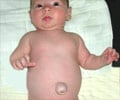Glossary
Abdomen: The part of the body that contains the pancreas, stomach, intestines,liver, gallbladder, and other organs.Acid Reflux: Adisorder in which acid in the stomach comes up into the oesophagus, because thevalve separating the stomach and oesophagus does not function properly.
Anemia: A condition in which the number of red blood cells is below normal.
Antacid: Neutralizes acid. In medicalterms, the neutralized acid is located in the stomach, oesophagus or first partof the duodenum.
Congenital: Present at birth.
Diaphragm: The sheet of muscle used in breathing that separates the chest from theabdomen.
Esophagus: The muscular tube through which food passes from the throat to thestomach.
Gastroscopy: Passing a tube with a camera on the end into the stomach.
Heartburn: Pain due to regurgitation (reflux) of juices from the stomach into the oesophagus; pyrosis.
Hernia: Also called rupture,"hernia" is a general term referring to a protrusion of a tissuethrough the wall of the cavity in which it is normally contained.
Hiatal hernia: A type of hernia in which the stomach bulges up into thechest cavity through an opening in the diaphragm.
Laparoscopy: Examination of theperitoneum through a lighted instrument.
Peritoneum: Membrane lining theabdominal cavity.













